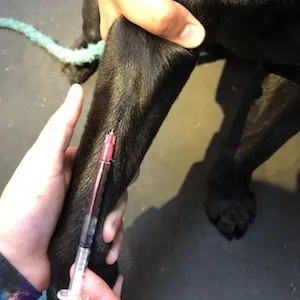Heartworm disease is a serious and potentially fatal condition affecting pets across the globe. Caused by long worms residing in the heart, lungs, and associated blood vessels, it leads to severe lung disease, heart failure, and damage to other organs. While it affects dogs, cats, and ferrets, heartworms can also inhabit wolves, coyotes, foxes, and, rarely, even humans.
 Heartworms
Heartworms
Dogs are natural hosts for heartworms. This means the worms mature, mate, and produce offspring within them. Without treatment, the number of worms can increase, with some dogs harboring hundreds. Heartworm disease inflicts lasting damage on the heart, lungs, and arteries, impacting a dog’s health and quality of life long after the parasites are gone. Therefore, prevention is paramount, and early treatment is crucial. Let’s explore the symptoms, transmission, and what to do if your dog tests positive. It’s also important to know the signs and symptoms of heartworms in dogs.
How Heartworm Disease Spreads
Mosquitoes play a vital role in the heartworm lifecycle. Adult female heartworms in an infected animal (dog, fox, coyote, or wolf) produce microfilariae, tiny baby worms that circulate in the bloodstream. When a mosquito bites an infected animal, it ingests these microfilariae. Over 10 to 14 days, the microfilariae develop into “infective stage” larvae within the mosquito. When the infected mosquito bites another dog or susceptible animal, these infective larvae are deposited on the skin and enter through the bite wound. Inside the new host, it takes about 6 months for the larvae to mature into adult heartworms, which can live for 5 to 7 years in dogs. This longevity means each mosquito season can increase the worm burden in an infected pet.
Identifying Heartworm Symptoms in Dogs
Early heartworm disease can be sneaky, with many dogs showing few or no symptoms. However, as the infection progresses, symptoms become more likely. Active dogs, those heavily infected, or dogs with other health issues often display more pronounced signs.
Possible symptoms of heartworm disease in dogs include:
- A mild, persistent cough
- Reluctance to exercise
- Fatigue after moderate activity
- Decreased appetite
- Weight loss
As the disease advances, dogs may develop heart failure, leading to a swollen belly from excess fluid accumulation. In severe cases, a large number of heartworms can cause a sudden blockage of blood flow within the heart, resulting in cardiovascular collapse, known as caval syndrome. This is marked by labored breathing, pale gums, and dark, bloody or coffee-colored urine. Without immediate surgical removal of the heartworm blockage, survival is unlikely. It’s important to be aware of the signs your dog is dying from heartworms so you can seek immediate veterinary attention.
 Dog blood being drawn
Dog blood being drawn
Assessing Your Dog’s Risk
Even if heartworms seem rare in your area, several factors influence your pet’s risk. The prevalence of heartworm disease may be higher than you think, or you might travel with your pet to areas where it’s more common. The disease is also spreading to new regions annually. Stray and neglected dogs, as well as wildlife like coyotes and foxes, can carry heartworms. Mosquitoes can travel long distances by wind, and infected pets relocated to previously uninfected areas also contribute to the spread.
Heartworm disease has been diagnosed in all 50 states, and risk factors are unpredictable. Climate variations and the presence of wildlife carriers cause infection rates to fluctuate dramatically, even within communities. Infected mosquitoes can also enter homes, putting both indoor and outdoor pets at risk.
The American Heartworm Society recommends a “think 12” approach: get your pet tested every 12 months and administer heartworm prevention year-round.
Heartworm Testing: What to Expect
Heartworm disease is a serious, progressive condition, and early detection improves the chances of recovery. Since early signs are often absent, regular testing by a veterinarian is essential. The test requires a small blood sample and detects heartworm proteins. Many veterinarians process tests in-house, while others send samples to a diagnostic lab. Results are typically available quickly. If the test is positive, further tests may be necessary to confirm the diagnosis and assess the severity of the disease.
All dogs should be tested annually for heartworm infection during a routine preventive care visit. Here are some guidelines:
- Puppies under 7 months: Can start on heartworm prevention without a test but should be tested 6 months after the initial visit, again 6 months later, and then annually.
- Adult dogs over 7 months (not previously on prevention): Need testing before starting prevention, then again 6 and 12 months later, and annually thereafter.
- Lapses in prevention: Test immediately, then again 6 months later, and annually.
Annual testing is crucial, even with year-round prevention, to ensure the program’s effectiveness. Heartworm medications are highly effective but not foolproof. Missed or late doses, spitting out pills, or rubbing off topical medications can leave your dog unprotected.
 Dog in a cage
Dog in a cage
What if Your Dog Tests Positive?
Hearing your dog has heartworm is upsetting, but most infected dogs can be treated successfully. The goal is to stabilize the dog, if showing signs, and then eliminate all adult and immature worms while minimizing side effects.
Here’s what to expect after a positive test:
- Confirm the Diagnosis: A positive antigen test should be confirmed with a different test to ensure accuracy before starting treatment.
- Restrict Exercise: Limit physical activity as soon as the diagnosis is confirmed, as exertion increases heart and lung damage. The more severe the symptoms, the less activity your dog should have.
- Stabilize Your Dog: Before heartworm treatment, your dog’s condition may need stabilization with appropriate therapy, potentially taking several months in severe cases.
- Administer Treatment: Your veterinarian will recommend a protocol, often following American Heartworm Society guidelines. Dogs with no or mild signs have a high treatment success rate. More severe cases can also be treated successfully, but the risk of complications is higher.
- Test (and Prevent) for Success: About 6 months after treatment, a heartworm test will confirm elimination of all worms. To prevent re-infection, administer heartworm prevention year-round for the rest of your dog’s life.
Understanding Heartworm Prevention
Whether it’s a pill, topical medication, or injection, heartworm preventives work by eliminating the immature (larval) stages of the parasite, including infective larvae deposited by mosquitoes. However, in as little as 51 days, larvae can molt into adults, which preventives can’t effectively eliminate. Therefore, strict adherence to the schedule is vital (monthly for oral and topical products, every 6 months for the injectable). Late administration allows larvae to reach the adult stage.
Puppies are as susceptible to heartworm disease as adult dogs. The American Heartworm Society recommends starting prevention as early as the product label allows, but no later than 8 weeks of age. Dosage is based on body weight, not age. Puppies grow quickly, so consult your veterinarian about anticipated dosage changes.
Is There a Vaccine for Heartworm Disease?
Currently, there is no commercially available vaccine for heartworm disease in dogs or cats. Prevention relies on consistent use of prescribed medications. These are available as monthly chewables, monthly topicals, and injections given once or twice a year. Consult your veterinarian to determine the best option for your pet. Many medications also prevent other parasites.
Heartworm disease is complex and affects vital organs, leading to varying outcomes. Adult worms cause blood vessel inflammation and block blood flow, potentially leading to pulmonary thrombosis and heart failure. Remember, these are “foot-long” parasites, and the damage can be severe. Heartworm disease can also lead to liver or kidney failure. Dogs exposed to many infective larvae are at high risk of sudden death. Other animals may live with a few adult worms for a long time without clinical signs until faced with an environmental change or another health problem.
If you’ve missed heartworm prevention doses, consult your veterinarian immediately, restart the medication, and retest your dog 6 months later, as heartworms must be about 7 months old for diagnosis.
